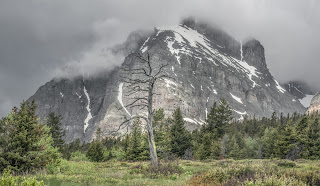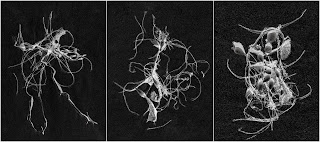Friday, September 30, 2022
Subjective Wholes
Thursday, September 29, 2022
Relation Between Observer and Thing
- W. Ross Ashby (1903 - 1972)
Wednesday, September 28, 2022
Peaceful Moments
- Paul Bowles (1910 - 1999)
The Spider's House
Sunday, September 25, 2022
Materializing the Invisible
with no artistic intentions.
but when it is photographed twice
it goes back to the reality again.
That is my theory.
to materialize the invisible
realm of the mind.
...
A photographer never makes an actual subject;
they just steal the image from the world…
Photography is a system of saving memories.
It’s a time machine, in a way,
to preserve the memory,
to preserve time.
into my photography.
It’s an act of God."
- Hiroshi Sugimoto (1948 - )
Monday, September 19, 2022
Little Ripples
edge of a world of which
we have no experience, and
where all our preconceptions
must be recast."
- D’Arcy Wentworth Thompson (1860 - 1948)
On Growth and Form
Saturday, September 17, 2022
Metaphorical Thought
- George Lakoff (1941 - )
Friday, September 16, 2022
All Things End in the Tao
Although it appears insignificant,
nothing in the world can contain it.
Naming is a necessity for order,
All things end in the Tao
flow through valleys to the sea."
Thursday, September 15, 2022
Time and Space as Dreams
- Minor White (1908 - 1976)
Postscript. The "Minor White: The Eye That Shapes" exhibit was hosted by the Museum of Modern Art (MoMA) in New York in 1989, with an accompanying book and catalog, edited by Peter C. Bunnell (used copies of which are sometimes still available, though they are not cheap: e.g., $80 from Amazon). Amazingly, MoMA has made a pdf of Bunnell's 322 page book available for free (it is a 62Mb download)! Kudos, MoMA 😊
Tuesday, September 13, 2022
Trust in Nature
- Rainer Maria Rilke (1875 - 1926)
Letters to a Young Poet
Monday, September 12, 2022
The Incomprehensible Void
Sunday, September 11, 2022
Contemplation
- Thomas Merton (1915 - 1968)
Saturday, September 10, 2022
It is All Transcendental
the real secret of magic,
is that the world is made of words.
And if you know the words
that the world is made of,
you can make of it
whatever you wish.
...
There is a transcendental
dimension beyond language...
It's just hard as hell to talk about!
...
Reality is, you know,
the tip of an iceberg of irrationality
that we've managed to drag
ourselves up onto for a
few panting moments before
we slip back into the
sea of the unreal.
...
It is the imagination that
within human beings.
It is literally a decent of
the World's Soul into all of us.
...
We live in condensations of our imagination.
...
The main thing to understand is
that we are imprisoned in
some kind of work of art.
...
There is no mundane dimension really,
if you have the eyes to see it,
it is all transcendental."
- Terence McKenna (1946 - 2000)
Friday, September 09, 2022
The Sage's Heart-Mind Mirror
- Chuang Tzu (c.369 B.C. - c.286 B.C.)
Thursday, September 08, 2022
The Subtle Gāthās of Rock and Water
- John Daido Loori (1931 - 2009)
The True Dharma Eye
Monday, September 05, 2022
Landscapes and Time
The first: In contemporary Western discourse... landscape may be defined in many different ways, but all incorporate the notion of time passing. Thus landscape as solid geology (as in a granitic landscape, a karst landscape) speaks to evolutionary time, aeons of time: all history in a grain of sand. Landscape as land form or topography (a desert landscape, a riverine landscape), again, has great time depth but may involve human interventions, human histories. With landscape as mantled (as in a landscape of peat and moor, a tropical landscape) the processes quicken, sometimes invoking seasonal transience. Landscape as land use (an arable landscape, a country house landscape, a plantation landscape) speaks of things done to the land action and movement, the effects of historically specific social/political/cultural relationships.
Sunday, September 04, 2022
Luminous Beings
- Carlos Castaneda (1925 - 1998)
Tales of Power
Saturday, September 03, 2022
Spielraum
- Edmund Husserl (1859 - 1938)
Experience and Judgment
Thursday, September 01, 2022
Ephemeral Sights
- Bill Jay (1940 - 2009)
"And so castles made of sand slips into the sea, eventually."
- Jimi Hendrix (1942 - 1970)
"All is ephemeral, both what remembers and what is remembered."
- Marcus Aurelius (121 - 180)


















